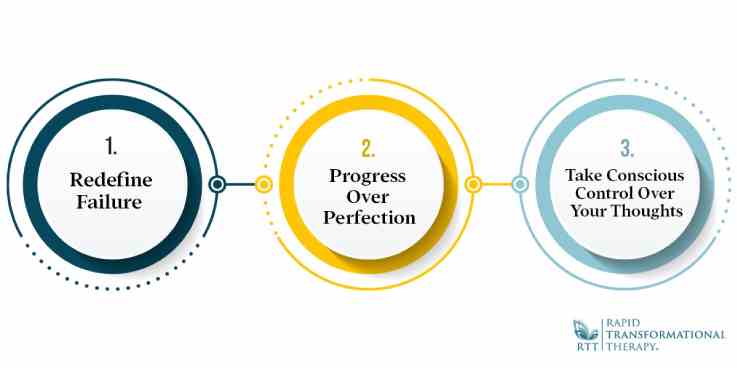If you experience a persistent, irrational fear when faced with uncertainty, you may be suffering from atychiphobia, also known as a fear of failure.
Atychiphobia prevents you from trying anything new and makes you shy away from competitive activities. It becomes almost impossible to do anything that is not guaranteed to succeed, which, in turn, arrests your personal development. This means you could avoid first dates, speaking in public, taking the career move you’ve been longing for.
It’s perfectly normal to feel a certain amount of fear regarding situations that put you at the edge of your comfort zone. But when it returns time and time again whenever you come up against anything that may involve a risk of failing, it is important you learn to overcome it, so you are not held back by your own mind.
If you want to know how to get over your fear of failing, read on to learn:
- What atychiphobia is (more commonly known as a fear of failure).
- What the symptoms of fear of failure are.
- How fear of failure can impact your life.
- What causes atychiphobia.
- How to overcome your fear of failure.
Let’s start with a definition of the fear, as well as why you need to learn to overcome it.
What Is The Fear Of Failure And Why You Should Let It Go
A phobia is an exaggerated sense of danger about something that, in actuality, is relatively harmless. It is also known as an irrational fear.
The definition of atychiphobia is an irrational, uncontrollable, and chronic fear of failure.
It’s taking away your motivation to succeed, and it’s making you feel threatened in the face of potential failure. Your life becomes limited as atychiphobia sabotages your ability to achieve.
Here’s the thing:
Nobody likes to fail, but when the fear of “doing something wrong” runs the show, it keeps you stuck in life. It does this by making you so risk-averse that you end up confined to your comfort zone for good.
Think about it; you could have asked for that promotion, written a book, or started that business you always dreamed of creating.
But you didn’t.
What was holding you back?
Because the fear and trepidation that were running through your veins as you thought of seizing those opportunities were too overwhelming.
As a result of those feelings, you ended up self-sabotaging your success. All because you avoid taking any risks at all, and they are necessary to achieve your goals.
There is a hefty price tag attached to a severe fear of failure. Even though you never fail at anything, the irony of it all is that this strategy leads to the ultimate failure in life—stagnation.
If you avoid taking risks, you don’t give yourself a fighting chance to accomplish anything and grow as a person.
In real-life, being scared of failure could look like this:
“Ok, today is the day I am going to talk to this cute girl and ask her out! Oh, but she probably has a boyfriend. What if I’m not good looking enough? What if I make a fool of myself? I’m sure she will reject me anyway…”
The truth is, you miss 100% of the shots you don’t take. You will never know how this cute girl would react if you approached her until you approach her.
Fear of failure is just your minds’ exaggerated response to situations with uncertain outcomes. Your mind is running a mental simulation of worst-case scenarios to keep you away from danger, even when there is nothing to be afraid of in the first place.
How Do You Know If You Have Atychiphobia?

There are a few signs of atychiphobia that can allow you to recognize if you struggle with a fear of failing. Some of the symptoms manifest as mental resistance; others include physical bodily sensations.
For example, when your boss asks you to complete a task that is far from what is already familiar to you, it may make you feel uneasy. You may experience not only a knot in your stomach but intense feelings of anxiety that are accompanied by a need to escape.
Some of the common mental signs of atychiphobia include:
- Procrastinating or working inefficiently on projects.
- Being too sensitive to criticism.
- Difficulty making new friends unless you are sure they will like you back.
- Rationalizing why something will not work or go wrong.
- A need to escape whenever faced with the possibility of failure.
- Intense feelings of panic or anxiety whenever you’re taking any form of risk.
Physical signs of fear of failure include:
- Hard time breathing.
- Fast heart rate.
- Digestive issues.
- Hot or cold flushes.
- Sweating.
How A Fair of Failure Can Impact Your Life

Having a fear of failing can negatively impact all areas of your life.
It makes you shy away from challenges at your work, relationships and makes you lose confidence when you need to assert yourself.
Even though avoidance might sound like a safer strategy for dealing with difficult situations than confronting them, it only works in the short term. In the long run, it’s a losing game.
Career:
In your career, you end up settling for less than you deserve. This happens because you are limited to only taking sure-fire projects and shy away from seizing career-changing opportunities that come your way.
Relationships:
In your romantic relationships, you end up taking the path of least resistance by never expressing your true wants and wishes. Instead of saying what’s truly on your mind, you go with the option that safeguards you against rejection or disapproval.
In the long term, this strategy is likely to leave your emotional needs unfulfilled. It can deprive you of the depth of relationships that you could otherwise experience.
Confidence:
Atychiophobia can send shivers down your spine whenever you are faced with the possibility of rejection, criticism, or any kind of failure.
That fear makes it impossible for you to take action on your dreams. It happens because retracting to your comfort zone feels safer than exposing yourself to the possibility of feeling like a failure.
What Causes Atychiphobia?
Marisa Peer, named Britain’s Best Therapist on more than one occasion, identified many Rules of The Mind. One of the most important Rules of The Mind you need to understand is that your mind’s #1 job is to serve you and keep you alive.
To do that, it needs to keep you away from pain. The problem is, your mind doesn’t know what is or isn’t painful until you have an experience of it.
For example, if you’ve ever accidentally touched a hot stove before, the pain of that mistake has now been imprinted on your mind and is added to the “things to avoid” list.
However, your mind’s ability to code information about what is dangerous and what isn’t is not perfect.
Here are a few possible reasons why you might have a fear of failure:
Negative childhood imprints

As small children, our minds and ability to navigate the world are in the early stages of development. If we acquire faulty imprints about the world in our childhood, they tend to linger to adulthood, and a phobia can develop.
Now think back to your childhood.
If your parents reinforced the notion that failure is terrible every time you made a mistake, you would likely grow up viewing failure as something negative.
That imprint can hold you back later on in life.
For example, it can result in you subconsciously avoiding trying new things or experiences because, in the back of your mind, you’re always scared to fail.
Traumatic events
If you experienced something in the past that made you feel embarrassed or humiliated, your mind could discourage you from doing anything resembling that activity by responding with fear.
Imagine delivering a presentation at work. You pull out the slides, show them on the projector, and your laptop suddenly runs out of battery and stops working midway. Because of that, you started to stutter and forgot parts of your presentation.
Your boss isn’t happy about this, because you made him look bad in front of a large client.
Negative emotions associated with an experience like that could prevent you from pursuing future opportunities and ultimately stifle your career.
Worrying about how others perceive you
Some people worry a lot about their social status. When your perception of yourself is too closely wrapped up in how others see you, this may cause you not to want to ‘fail’ in front of them, leading to atychiphobia.
Lack of self-confidence
You delay taking action on your goals and dreams because you are afraid that people might reject your ideas. You think it is better not to put yourself out there to avoid getting hurt.
How Do You Get over Atychiphobia?

If you struggle to overcome the fear of failure, it’s because your conscious and subconscious minds are at odds with each other. Your conscious mind charges forward in the direction of your dreams while your subconscious mind holds you back.
Since your subconscious mind wins the internal struggle most of the time, you may feel the urge to procrastinate, distract yourself, or downright quit when the time to act comes.
As Marisa Peer says, “In a battle between emotion and logic, emotion always wins.”
Your subconscious mind will provoke traumatic thoughts and images of catastrophic failure. Those will rob you of your motivation and cause you to doubt yourself and not even want to try.
“What you feel is the result of the words and images you construct in your mind,”—Marisa Peer.
But here’s the good news:
No one is born with a fear of failing. It is something acquired, and it means that it can be released, as long as you have the right tools for change.
3 Simple ways to overcome a fear of failing
Here are three practical methods that will help you overcome a fear of failure right now.

1. Redefine failure
There is no way around it; failure is an inevitable part of your journey towards getting success.
So instead of avoiding failure because of disempowering thoughts such as “I failed,” replace that thought with “I learned.”
Reframing your mindset and viewing failure as a learning opportunity, differentiate successful people from the rest of the crowd. Many of them claim that their career and life’s most significant breakthrough came right after their biggest failures.
Instead of throwing in the towel before you even start, look failure dead in the eyes and allow it to happen. Make failure your friend and not your foe. Only then will you be able to realize that it’s your greatest teacher. One that will point the right way towards your success.
2. Progress over perfection
If you feel like your fear of failure comes from a strong desire for perfection, shift all of your focus on progress. Allow yourself to do a sloppy job on your first or second attempt and realize that nothing bad came out of it.
For example, if you are writing a book, realize that your first or second drafts are probably not going to be your best work—and that’s fine. Treat your first attempts as drafts.
There is more:
When you focus on progress over perfection, you will naturally start to optimize your efforts when you get to your second or third try.
You’ll find that you start to enjoy the process of gradual improvement and detach from being overly obsessed with perfection.
3. Take conscious control over your thoughts
At any given moment, you have a choice to take control of your thoughts. Instead of going down the rabbit hole of negative thinking, you can choose to switch them up.
Marisa Peer, a world-renowned speaker, therapist, and best-selling author, likes to say: “Your thoughts control your feelings, your feelings control your actions, and your actions control your life.”
Pay extra attention to your thoughts and feelings. When you catch yourself obsessing over failure, change your words and images to more empowering ones.
How to do it?
Become aware that images and words you create in your mind as you experience the fear are not ultimately real. That recognition alone will allow you to create distance between you and those thoughts.
This will free you from the need to take your thoughts so seriously. It will also allow you to consciously replace negative words and images with ones that help you.
If you notice yourself always looking for what might go wrong, try to think of all the reasons why it may go right. It won’t come naturally at first, but it will become second nature after some time.
Consciously shaping your inner dialogue opens the door to new opportunities that were previously not visible to you. This is what ultimately changes your life.
The Most Effective Way to Overcome Fear of Failure

Rapid Transformational Therapy® (RTT®)
Even though the techniques mentioned above can help you cope with your fear of failure, there are even more powerful ways to address the root cause of your problems that lie in your subconscious mind.
Reprogramming your subconscious mind to work for you instead of against you is the sole focus of Rapid Transformational Therapy® (RTT®).
Rapid Transformational Therapy® (RTT®) is an incredibly effective result-driven approach created by celebrity therapist Marisa Peer after 30+ years of working with people all over the world.
Rapid Transformational Therapy® (RTT®) combines the most powerful aspects of hypnosis, psychotherapy, cognitive-behavioral therapy, and more to help release your fears.
It helps you go deep into your subconscious mind, access the root causes of issues you have been struggling with by changing the stories, words, and pictures you create in your mind.
RTT® can help you to overcome a fear of failure in 3 steps:
- First, you will enter a deep, relaxing state of trance. It will allow you to go back and have a look at where the phobia came from.
- Secondly, you will change negative pictures and words your mind associates with failure with empowering ones.
- Thirdly, you will start to make your new belief familiar. The more you can reinforce your new belief by repeating it, the more evidence you will find in your day-to-day life that failure is not something that you should be afraid of.
With the guidance of a certified RTT® therapist, you can rewrite your story and swap negative pictures associated with failure with the ones that bring positive and empowering emotions.
You can finally allow yourself to experience the happiness and fulfillment that comes from achieving your goals.
The 21-Day Unstoppable Confidence Challenge
A fear of failure has an immeasurable negative impact on your overall confidence and well-being. As we have discovered throughout this article, a fear of failure is likely to have a root cause somewhere deep in your unconsciousness, which is tied to your self-esteem and self-confidence. If you can improve your confidence, then the impact of your fear of failure will lessen, and eventually, be conquored.
If you are looking to take an active role in overcoming your fear of failure, why not consider participating in Marisa Peer’s 21-Day Unstoppable Confidence Challenge? In a three week period, you will undergo daily training, receive several audios and meditations, and join a thriving community of people all investing in their well-being just like you. You will develop the building blocks you need to adopt unshakeable confidence, which will help you overcome your fear of failure for good.
Interested? Click the banner below to learn more and get signed up to the next challenge starting soon!

Closing Thoughts
Facing a fear of failure can be a challenging task, but it doesn’t have to be that way.
Remember that no matter how bad your atychiphobia is, you were not born with it. It’s something you acquired, which means it can be released.
However, the permanent solution to your fear is buried deep within your subconscious mind. Once you tap into its unlimited potential and make it work with, instead of against you, you will experience incredible growth.
If you feel that a 1-on-1 approach would work better for you, you can book a call with one of our certified RTT® therapists. You will finally be able to get to the root cause of your phobia and conquer the fear of failure once and for all.




